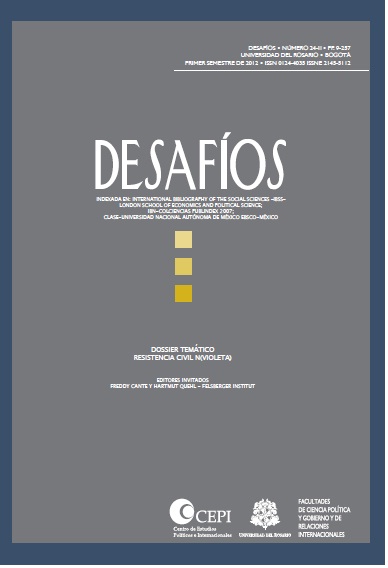Al-Qaeda y la política internacional: una reflexión teórica
Barra lateral del artículo
Contenido principal del artículo
Descargas
Rafat Ghotme, Universidad Militar Nueva Granada
Doctorando en Estudios Políticos y Relaciones Internacionales, Universidad Nacional de Colombia.Ali, T. (2005). El choque de los fundamentalismos: cruzadas, yihads y modernidad. Madrid: Alianza.
Alkhalifa, W. (2007). El ala radical del Islam. Islam Político: realidad y ficción. Madrid: Siglo XXI.
Arquilla, J. y Ronfeldt, D. (2003). Redes y guerras en red. El futuro del terrorismo, el crimen organizado y el activismo político. Madrid: Alianza.
Arrighi, G. y Silver, B. (2000). Caos y orden en el sistema-mundo moderno. Madrid: Akal.
Asad, T. (1993). Genealogies of religion: discipline and reasons of power in Christianity and Islam. Baltimore: John Hopkins University Press.
Ayubi, N. (1996). El Islam Político. Teorías, tradición y rupturas. Barcelona: Ediciones Bellaterra.
Barber, B. (2001). Jihad versus Mc World: terrorism´s challenge to democracy. New York: Ballantine Books.
Barnavi, É. (2007). Las religiones asesinas. Madrid: Turner.
Benjamin, D. y Simon, S. (2002). The age of sacred terror. New York: Random House.
Berger, P. (1999). The desecularization of the world: the resurgence of religion in world politics. Washington: Ethics and Public Policy Center.
Bergesen, A. (1990).Turning world-system theory on its head. Theory, Culture & Society, 7, 67-81.
Bergesen, A. y Lizardo, O. (2004). International terrorism and the world-system. Sociological Theory, 22, 38-52.
Betts, R. (1998). The new threat of mass destruction. Foreign Affairs, 77 (1), 26-41.
Blinken, A. (2012). Is Iraq on Track?: democracy and disorder in Baghdad. Foreign Affairs, 91 (4), 152-154.
Boli, J. y Thomas, G. (Eds.). (1999). Constructing world culture: international nongovermental organizations since 1875. Stanford: Stanford University Press.
Boucek, C. (2009). Yemen: avoiding a downward spiral. Carnegie Papers, Middle East Program, No. 102. Recuperado de http://www.carnegieendowment.org/files/yemen_downward_spiral.pdf.
Burgat, F. (2006). El islamismo en tiempos de al-Qaida. Barcelona: Ediciones Bellaterra.
Campanini, M. (2003). Islam y Política. Madrid: Editorial Biblioteca Nueva.
Campos, N. y Gassebner, M. (2009). International terrorism, political instability and the escalation effect, Bonn, IZA, Discussion Paper No. 4061.
Chomsky, N. (2003). Poder y terror: reflexiones posteriores al 11-09-2001. Barcelona: RBA.
Clausewitz, K. (1999). De la guerra: táctica y estrategia. Barcelona: Idea Books.
Cohn, J. (2010). Islamist radicalism in Yemen. Council on Foreign Relations. Recuperado de http://www.cfr.org/yemen/islamist-radicalism-yemen/p9369.
Creveld, M. (1991). The transformation of war: the most radical reinterpretation of armed conflict since Clausewitz. New York: Free Press.
David, C. P. (2009). La guerra y la paz. Enfoques contemporáneos sobre seguridad y estrategia. Barcelona: Icaria.
Downes, A. (2010). Catastrophic success: foreign-imposed regime change and civil war. Duke University. Recuperado de http://www.duke.edu/~downes/ DOWNES_CATASTROPHIC%20SUCCESS_JULY2010.pdf
Durkheim, E. (1988). Las reglas del método sociológico y otros escritos sobre filosofía de las ciencias sociales. Madrid: Alianza.
Fallaci, O. (2006). La rabia y el orgullo. Madrid: La Esfera de los Libros.
Farrall, L. (2011). How al Qaeda works. What the organization´s subsidiaries say about its strenght. Foreign Affairs, 90 (2), 128-136.
Ferguson, N. y Kotlikoff, L. (2003). Going critical: American power and the consequences of fiscal overstretch. The National Interest, 73, 22-32.
Finnemore, M. (2009).Legitimacy, hypocrisy, and the social structure of unipolarity: why being a unipole isn’t all it’s cracked up to be. World Politics, 61 (1), 58-85.
Frank, J. Hironaka, A. y Schofer, E. (2000). The Nation-State and the natural environment over the twentieth century. American Sociological Review, 65, 96-116.
Friedman, T. (2002). Longitudes and attitudes: the world in the age of terrorism. New York: Farrar, Straus and Giroux.
Fukuyama, F. (1994). El fin de la historia y el último hombre. Madrid: Planeta. Fukuyama, F. (2004). La construcción del Estado: hacia un nuevo orden mundial en el siglo xxi. Barcelona: Ediciones B.
Ghalioun, B. (1999). Islam y política: las traiciones de la modernidad. Barcelona: Ediciones Bellaterra.
Ghotme, R. (2011). La configuración del poder en el sistema internacional contemporáneo. Revista de Relaciones Internacionales, Estrategia y Seguridad, 6, (1), 47-74.
Ghotme, R. (2012). La reconducción estratégica de al-Qaeda: ¿del liderazgo de Osama bin Laden a la dimensión masiva-popular? Civilizar, 12 (22), enero-junio, 111-128.
Gilpin, R. (1999 [1981]). War and change in world politics. New York: Cambridge University Press.
Gordon, P. (2007). Can the war on terror be won? Foreign Affairs, 86 (6), 53-67.
Graff, C. (2010). What You should know about Yemen. The Brookings Institution. Recuperado de http://www.brookings.edu/experts/graffc.aspx.
Haass, R. (2008). The age of nonpolarity: what will follow U.S. dominance. Foreign Affairs, 87 (3), 44-56.
Hadley, S. y Podesta, J. (2012). The right way out of Afghanistan: leaving behind a State that can govern. Foreign Affairs, 91 (4), 41-53.
Hall, M y Jackson, P. (Eds.). (2007). Civilizational identity: the production and reproduction of ‘civilization’ in international relations. New York: Palgrave.
Hoffman, B. (2006). Inside terrorism. Columbia University Press. Hoffman, S. (2002). Clash of globalizations. Foreign Affairs, 81, 104-115.
Holsti, K. (1995). International politics: a framework for analysis. N. J.: Englewood Cliffs- Prentice-Hall International.
Hudson, R. (1999). Who becomes a terrorist and why: the 1999 Government report on profiling terrorists Guilford: Lyons Press.
Huntington, S. (1987). The goals of development. En, M. Weiner y S. Hungtinton (Eds.), Understanding political development (3-32). New York: Harper Collins Publishers.
Huntington, S. (1997). El choque de civilizaciones y la reconfiguración del orden mundial, Barcelona: Paidós.
Ikenberry, J., Mastanduno, M. y Wohlforth, W. (2009). Introduction: unipolarity, State behavior, and systemic consequences. World Politics, 61 (1), 1-27. International
Monetary Fund, (2011). World economic outlook. Recuperado de http://www.imf.org/external/pubs/ft/weo/2011/01/
Jackson, R. (2011). Culture, identity and hegemony: continuity and (the lack of) change in US counterterrorism policy from Bush to Obama. International Politics, 48 (2/3), 390-411.
Jervis, R. (2009). Unipolarity. A structural perspective. World Politics, 61 (1), 188-213. Johnson, C. (2004a). Las amenazas del imperio: militarismo, secretismo y el fin de la república. Barcelona: Crítica.
Johnson, C. (2004b). Blowback: costes y consecuencias del imperio americano. Pamplona: Laetoli. Jurgensmeyer, M. (2000). Terror in the mind of God: the global rise of religious violence. Berkeley: University of California Press.
Keck, M. y Sikkink, K. (1998). Activist beyond borders: adovacy networks in international politics. Cornell University Press.
Kennedy, P. (1989). Auge y caída de las grandes potencias. Barcelona: Plaza y Janés Editores. Keohane, R. (2012).
Hegemony and after: knowns and unknowns in the debate over decline. Foreign Affairs, 91 (4), 114-118.
Koopmans, R. (1993). The dynamics of protest waves: West Germany, 1965 to 1989. American Sociological Review, 58, 637-58.
Krauthammer, C. (1990-1991). The unipolar moment. Foreign Affairs, 70 (1), 23-33.
Laidi, Z. (1998). A world without meaning: the crisis of meaning in international politics. London: Routledge.
Layne, C. (2004). The war on terrorism and the balance of power: the paradoxes of American hegemony. En T. V. Paul, J. Wirtz y M. Fortmann (Eds.), Balance of power: theory and practice in the 21st century (pp. 103-126). Stanford: Stanford University Press.
Layne, C. (2006). Impotent power? Re-examining the nature of America´s hegemonic power. The National Interest, 85, 41-47.
Malkasian, C. y Weston, J. K. (2012). War downsized: how to accomplish more with less. Foreign Affairs, 91 (2), 111-121. Mallaby, S. (2004). NGOs: Fighting poverty, hurting the poor. Foreign Policy, 2004, 51-58.
Mandaville, P. (2009). How do religious beliefs affects politics? En J. Edkins y M. Zehfuss (Eds.), Global politics. A new introduction. New York: Routledge.
Mann, M. (2004). El imperio incoherente: Estados Unidos y el nuevo orden internacional. Barcelona: Paidós.
Mastanduno, M. (1997). Preserving the unipolar moment: realist theories and U.S. grand strategy. International Security, 21, 49-88.
Mastanduno, M. (2009). System maker and privilege taker: U.S. power and the international political economy. World Politic, 61 (1), 121-154.
McAdam, D. Tarrow, S. y Tilly, C. (2001). Dynamics of contention. Cambridge: Cambridge University Press.
Mearsheimer, J. (2001). The tragedy of great power politics. New York: Norton.
Mearsheimer, J. (2011). Imperial by design. The National Interest, 111, 16-34.
Meyer, J., Boli, J., Thomas, G. y Ramirez, F. (1997). World society and the Nation-State. American Journal of Sociology, 103, 144-181.
Ng, A. (2011). In focus: Al Qaeda in the Arabian Peninsula (AQAP) and the Yemen uprisings. International Centre for Political Violence and Terrorism Research, 3 (6). Recuperado de http://www.pvtr.org/pdf/CTTA/2011/ CTTA-June11.pdf.
Nye, J. (1991). La naturaleza cambiante del poder norteamericano. Buenos Aires: Grupo Editor Latinoamericano.
Nye, J. (2003). La paradoja del poder norteamericano. Bogotá: Taurus.
Nye, J. (2010). The future of American power: dominance and decline in perspective. Foreign Affairs, 89 (6), 2-14.
Parent, J. y MacDonald, P. (2011). The wisdom of retrenchment: America must cut back to move forward. Foreign Affairs, 90 (6), 32-47.
Parker, N. (2012). The Iraq we left behind: welcome to the world´s next failed State. Foreign Affairs, 91 (2), 94-110.
Paul, T. V. (1994). Asymmetric conflicts: war initiation by great powers. Cambridge: Cambridge University Press.
Paul, T. V. (2004). Introduction: the enduring axioms of balance of power theory and their contemporary relevance. En T. V. Paul, J. Wirtz y M. Fortmann (Eds.), Balance of power: theory and practice in the 21st century (pp. 1-25). Stanford: Stanford University Press.
Pieterse, J. (1994). Fundamentalism discourses: enemy images. Women against Fundamentalism Journal, 5, 2-6.
Ramirez, F, Soysal, Y. y Shanahan, S. (1997). The changing logic of political citizenship: cross-national acquisition of women´s suffrage rights, 1890-1990. American Sociological Review, 62, 735-745.
Reich, W. (Ed.) (1990). Origins of terrorism: psychologies, ideologies, theologies, states of mind. Cambridge: Cambridge University Press.
Riedel, B. (2007). Al-Qaeda strikes back. Foreign Affairs, 86 (3), 24-40. Robertson, R. (1992). Globalization: social theory and global culture. London: Sage.
Rodman, P. (2000). The world’s resentment: Anti-Americanism as a global phenomenon. The National Interest, 60, 33-41.
Roy, O. (2003). El Islam mundializado: los musulmanes en la era de la globalización. Barcelona: Ediciones Bellatrerra.
Roy, O. (2007). El Islam y el caos: el mundo islámico ante los retos del siglo xxi. Barcelona: Ediciones Bellaterra.
Said, E. (2001). Cultura e imperialismo. Barcelona: Anagrama. Said, E. (2008 [1978]). Orientalismo. Barcelona: DeBolsillo.
Sassen, S. (1998). Globalization and its discontents. New York: New Press.
Sasson, J. (2009). Bajo la sombra del terror: la vida secreta de Osama Bin Laden revelada por su esposa e hijo. Bogotá: Norma.
Sklair, L. (1995). Sociology of the global system. Baltimore: Johns Hopkins University Press.
Slaughter, A. (2004). A new world order. Princeton, Princeton University Press.
Snow, D. y Benford, R. (1992). Master frames and cycles of protest. En A. Morris y C. McMueller (Eds.), Frontiers in social movement theory (pp. 133-155). New Haven: Yale University Press.
Soysal, Y. (1994). Limits of citizenship: migrants and postnational membership in Europe. Chicago: University of Chicago Press.
Stepanova, E. (2008). Terrorism in asymmetrical conflict. Ideological and structural aspects. Oxford University Press. Thayer, B. (2006). In defense of primacy. The National Interest, 86, 32-38.
Todorov, T. (2008). El miedo a los bárbaros. Más allá del choque de civilizaciones. Barcelona: Galaxia Gutenberg, Círculo de Lectores. Tomlinson, J. (1999). Globalization of culture. Chicago: University of Chicago Press.
Viotti, P. y Kauppi, M. (2009). International relations and world politics. Security, economy, identity. New Jersey: Pearson.
Wallerstein, I. (1998). Utopística o las opciones históricas del siglo xxi. México: Siglo Veintiuno.
Wallerstein, I. (2004). Capitalismo histórico y movimientos antisistémicos: un análisis de sistemas-mundo. Madrid: Akal.
Wallerstein, I. (2005). La decadencia del poder estadounidense: Estados Unidos en un mundo caótico. México: Ediciones Era.
Walt, S. (1987). The origins of alliances. Ithaca: Cornell University Press. Walt, S. (2005). Taming American power: the global response to U.S. primacy. Nueva York: W.W.
Norton. Walt, S. (2009). Alliances in a unipolar world. World Politics, 61 (1), 86-120. Walt, S. (2011). The end of the American era. The National Interest, 116, 6-16.
Waltz, K. (1999). Globalization and governance. PS: Political Science and Politics, 32 (4), 693-700.
Waltz, K. (2000). Structural realism after the Cold War. International Security, 25 (1), 5-41. Wilkinson, P. (2005). International terrorism: the changing threat and the EU´s response. Institute for Security Studies, Chaillot Paper, No. 84.
Williams, P. (2002). Transnational organized crime and the State. En R. B. Hall y T. J. Biersteker (Eds.), The emergence of private authority in global governance (pp. 161-181). Cambridge University Press.
Zakaria, F. (2000). De la riqueza al poder. Los orígenes del liderazgo mundial de Estados Unidos. Barcelona: Gedisa.



